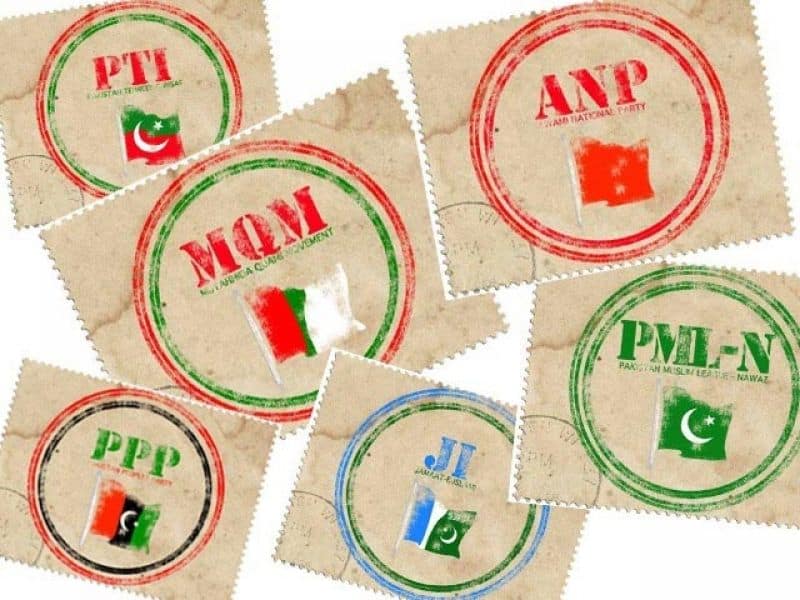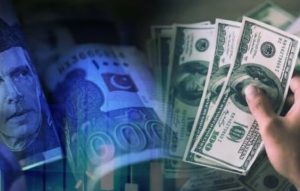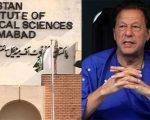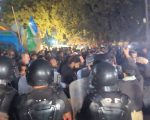Fabric of psychological makeup
Human instinct dominantly relies more on what one experiences and far less on what one is advised to do no matter how convincing that piece of advice may be. We see others and everything else from the prism of our observations and experiences with which the passage of time become a core part of our belief system. This is how we determine our moral values on the basis of which we make our heroes, villain and develop our social and political tendencies.
At an intellectual level, we only go through reading material that complements our preconceived notions and interpret everything from the known sources of knowledge based on our isolated experience and observations in the life. This lead us to craft an isolated ideological view of our own morality and values and any one fitting into the domain of our such world view becomes our friend and heroes and vice versa. At a broader level, with the same mindset we formulate our political opinion and at the historical level, we evolve our approach towards the religions and their associated sects.
Psychological disorder of political elite
Those who introspectively challenge their own thought process are exceptions who never wanted history to remember them but history did not forget them. History either forgets or tarnishes those who burn with the a desire to cultivate a name for themselves. This category of people who base their own isolated experience and observations as a yardstick to challenge the world view of others, are ordinary folk which also largely include the political elite in Pakistan. Their ideology is very pragmatic and self-centered. It is based on their subconsciously imbibed greed and desire to govern Pakistan no matter at what cost.
Psychologically speaking this mental condition is known as a narcissistic personality disorder which reflects a deep-seated sense of self-loving, self-admiring and hence they centre themselves around everything that matters in politics. This personality disorder misleads them to consider themselves indispensable to protect the rights of the people and hence they virtually deem themselves above the normal cycle of the law of the land.
A large number of the population particularly those in a position of authority in both private and public sectors suffer from this narcissistic personality disorder with a varying degree of intensity in their conduct. Therefore as a rule when something becomes so common, it becomes equally difficult to even identify and admit it as a psychological disorder. Nonetheless, this personality disorder has been oozing out in the conduct of leading politicians like deposed Prime Minister Nawaz Sharif, former President Asif Zardari and particularly the former military dictator General Pervez Musharraf.
Self-deceptive mode
Leading politicians and military dictators have been in a self-deceptive mode in conducting their political business. The politicians shield their vested interests by sloganeering to fight for the democratic rights of the people while military dictators like Musharraf have done it under the garb of protecting national interests.
Over a period of time, politicians have negatively evolved their psychological makeup to a tipping point where they subconsciously start believing in themselves to be ideologues. Hence they project themselves to become champions to the lofty goal of civilian supremacy over army and judiciary. Precisely fitting into this category are deposed premier Nawaz Sharif and former President Asif Zardari. As and when their power base was threatened, they ended up exposing their real self which is to aggressively shield the very core of their vested personal and political interests, that is to keep their personal hold on power and political party they formally or informally preside over. The core of their struggle has been to perpetuate their direct or indirect rule or manipulate their return to corridors of powers by hook or crook.
Nawaz Sharif’s dilemma
Nawaz Sharif was notoriously known to have cultivated links in the superior judiciary until the Supreme Court’s damning judgments on July 28, 2017. The court ruling buried down the decade-old perception that he was a favourite child of the judiciary which would never go against him. Before the court ruling, the media was abuzz with reports that unlike Sharif’s past attempts behind the scene to win over judges and investigators, his present efforts were falling apart.
The court proceedings and findings of a Joint Investigation Team set up under the orders of the Supreme Court exposed step by step the scale and methodology of money-laundering with which the public funds were allegedly siphoned off from Pakistan to set up a network of at least 16 offshore companies and several steel mills in Middle East and Western destinations. Under the law of the land, he was bound to prove his innocence but all his attempts to do so ended up in indulging himself and his family in large scale forgery of bogus documents.
His systematic reliance to knock down petitions of the opposition parties on technical legal grounds exposed during the apex court proceedings. The legal facts against him and the forged documents that his family prepared to save his rule is an open secret. Nonetheless, his loyalists were reporting informally to the media that judges would be “managed”. But it was shocking for them when the final judgement of the top court disqualified Nawaz Sharif and ordered his trial on “corruption and corrupt practices.” His troubles are far from over yet. Given the legal strength of the evidence against Nawaz Sharif’s, he is likely to be convicted. Therefore, the deposed Prime Minister Nawaz Sharif feels deeply hurt, humiliated and disgraced. His direct verbal assault on judges and his indirect provocation against the military reflects a bitter and resentful psychological makeup of his mind particularly since he was disqualified by Pakistan’s Supreme Court for lying to the nation by illegally hiding his offshore business abroad.
Therefore, now he only listens seriously to the advice of those who share his bitterness against the military while his open harsh criticism against the judiciary is his method in the madness to rally the public against the army which he believes was in league with the Supreme Court. The bigger trouble for him is that overwhelming evidence against him and his family is not letting his propaganda gain credibility among the majority of the population.
Sense of indispensability, a psychological disorder
Despite being ousted, Nawaz Sharif continues to remotely control the affairs of federal government through his hand-picked loyalist Shahid Khaqaan Abbasi and chosen federal ministers and an army of advisors and other senior officials. Nonetheless, he publicly sounds disappointed over his ouster and believes that the economy has derailed and youngsters now would not be getting job opportunities. Conscious of not being perceived publicly as a “ power hungry” he has been saying all along that he is no longer engaged in the struggle of becoming Prime Minister for the fourth time. However, the truth did slip out in at least one of his public addresses where he sought confirmation from the crowd that they would elect him as Prime Minister again.
A bizarre rationale to seek immunity from corruption
The focal point of Nawaz Sharif’s tirade has been that he would go to any extent to restore the sanctity of the vote with which successive Prime Ministers have been elected but subsequently ousted through military coups and judicial verdicts.
It makes sense when he speaks on how military coups trampled upon the sanctity of the votes but it doesn’t make sense when he seeks immunity from all plausible corruption and money laundering charges by pleading that no one has a right to oust an elected Prime Minister under any circumstance.
The country is run under the Constitution enacted by the elected members of the Parliament which have authorized the Supreme Court to adjudicate on all kind of matters linked with the corruption or anything else against the Prime Minister and other public office holders.
A threat to a nascent rule of law
He was almost short of directly abusing the judiciary through different phrases going far beyond contempt of court, something tantamount to incite violence against the judges who delivered a historical verdict against all heavy odds his administration created to obstruct the justice.
Since 2007, the judiciary has created some semblance of impartiality after a mass movement erupted against the then military dictator General Pervez Musharraf who had twice removed the then Chief Justice Iftikhar Muhammad Chaudhary. After General Musharraf, it was Zardari who refused to restore constitutional judges until a mass movement headed by lawyers and supported by Nawaz Sharif and other politicians compelled his party’s government to reinstate them. Now Nawaz Sharif has turned out to be the biggest threat to the nascent rule of law after Zardari and Musharraf. It would be a recipe for political chaos if his propaganda against the judiciary gains traction among people.
Facts behind his tirade of sanctity of vote
Nawaz Sharif has been an averagely popular leader. His support base has been largely in major urban centres in Punjab, the business community, intelligentsia and the influential media which has been building up a political narrative in his favour. His electoral victory’s hinged upon the support from the military in the past.
Sharif has been the favourite child of the military which helped him to become Prime Minister three times with heavy mandate and each time, the army helped him to rig the general elections in 1990, 1997 and 2013. The evidence of rigging has been all around.
General Elections in 2013
There is a consensus among all political parties that elections were heavily rigged in 2013 allegedly through lower judiciary with the backend support of the then military Chief General Ashfaq Pervez Kayani. There could have been reelections had Imran Khan Chairman Pakistan’s Tehreek Insaaf (PTI) played his political cards well in-time.
Khan committed a political blunder to refuse to accept anything short of Nawaz Sharif’s resignation during the peak of besieging of the Parliament by his supporters in 2014. Short of resignation, the deposed premier had agreed to accept his strict terms and conditions on the basis of which the Supreme Court had to adjudicate the fate of rigged elections. However, time and tide wait for none. Subsequently, Khan lost the invisible support of the military and intelligence establishment and his supporters thinned out from the sit-in protest. In the meanwhile, the tragic terror attack happened at an army public school in Peshawar killing around 150 innocent children and teachers in December 2014. This provided Imran Khan with the face-saving he needed to end his sit-in protest and resume negotiation with the government. But this time talks restarted on critically important terms and conditions which Nawaz Sharif managed to dictate after military’s support swung in his favour. Since terms of reference of the agreement were so weak, the Supreme Court knocked down the PTI’s entire case on technical legal grounds. The findings of the court did not say that the rigging did not happen but concluded that the rigging has not affected the overall electoral results in a manner to change the existing power equation in the provincial and national Parliaments.
General Elections in 1997
I can recall that months before general elections in February 1997, I reported in Islamabad based Weekly Pulse that the military had decided to rig elections in favour of Nawaz Sharif with two third majority. And days before the elections, many journalists even knew the number of seats the political parties would be made to win in the electoral contest by the Establishment. People’s Party ended up in blaming large scale rigging after it was restricted to only 18 seats of National Assembly.
General Elections in 1990
The general elections in 1990 were also rigged. Not long ago, the Supreme Court under Justice Iftikhar Chaudhary sprang into action and ordered to probe Nawaz Sharif and many other politicians for receiving money from the military generals to manipulate the general elections. The rigging was not confined to pre-poll but there were credible reports that elections were also rigged through ballots as well. The investigation remains and is likely to remain inconclusive given the fact that the military would not like its retired generals to be disgraced for rigging they undertook under the cover of “ national interests”. So would be the fate of other politicians since Nawaz Sharif whose party is still in power, would not let country’s Federal Investigation Agency independently probe into the plausible rigging allegations.
Selective justice and legacy of misrule of General Musharraf
Musharraf’s overseas foreign currency accounts are documented facts but he says “dare not question him”. Until Musharraf is tried in a court of law on varying pending charges of murder, corruption and subverting the constitution, the public perception would stay on the ground that the Military Establishment is facilitating a selective accountability of its opponents. This would help Nawaz Sharif find sympathetic ears in public but only when he would focus more on prevailing selective justice and less on his own accountability.
Nawaz Sharif has cogent reasons to propagate that he has been a victim of selective justice when he rightly points out that the scale of crimes of military dictator General Pervez Musharraf who carried an odd distinction in the history of Pakistan to have imposed two martial laws first in 1999 against the elected government and second in 2007 against the judiciary.
He is on record to have said that had Nawaz Sharif not sacked him, he would not have imposed martial law in 1999. Similarly, when he feared that the Supreme Court was likely to disqualify him before he takes oath as the President, he in his capacity as an army Chief declared martial law “in the national interest” in 2007. As a matter of fact, his second martial law was again in his “personal vested interests” reflecting his “narcissistic personality disorder”. He, however, propagated that his imposition of second martial law was designed to prevent the judiciary from derailing his version of democracy. Later on the Parliament through the 18th amendment, stripped off the constitutional cover to his 1999’s takeover and refused to provide constitutional immunity to his second martial law. Subsequently, the Supreme Court declared him as a usurper and Nawaz Sharif very boldly decided to try him on high treason charges.
However, he had to abandon his trial after intense pressure from the military which he could not have withstood since he had skeletons in his own cupboard. As a Prime Minister, he did everything to please the military to sustain his rule. He crossed the red line and suspended the fundamental rights of the citizens through government sponsored constitutional amendments first in 2015 and second in 2017 which legalized all alleged kidnapping, torturing and killing of suspected citizens with retrospective effects by intelligence agencies under the cover of so-called war on terror.














